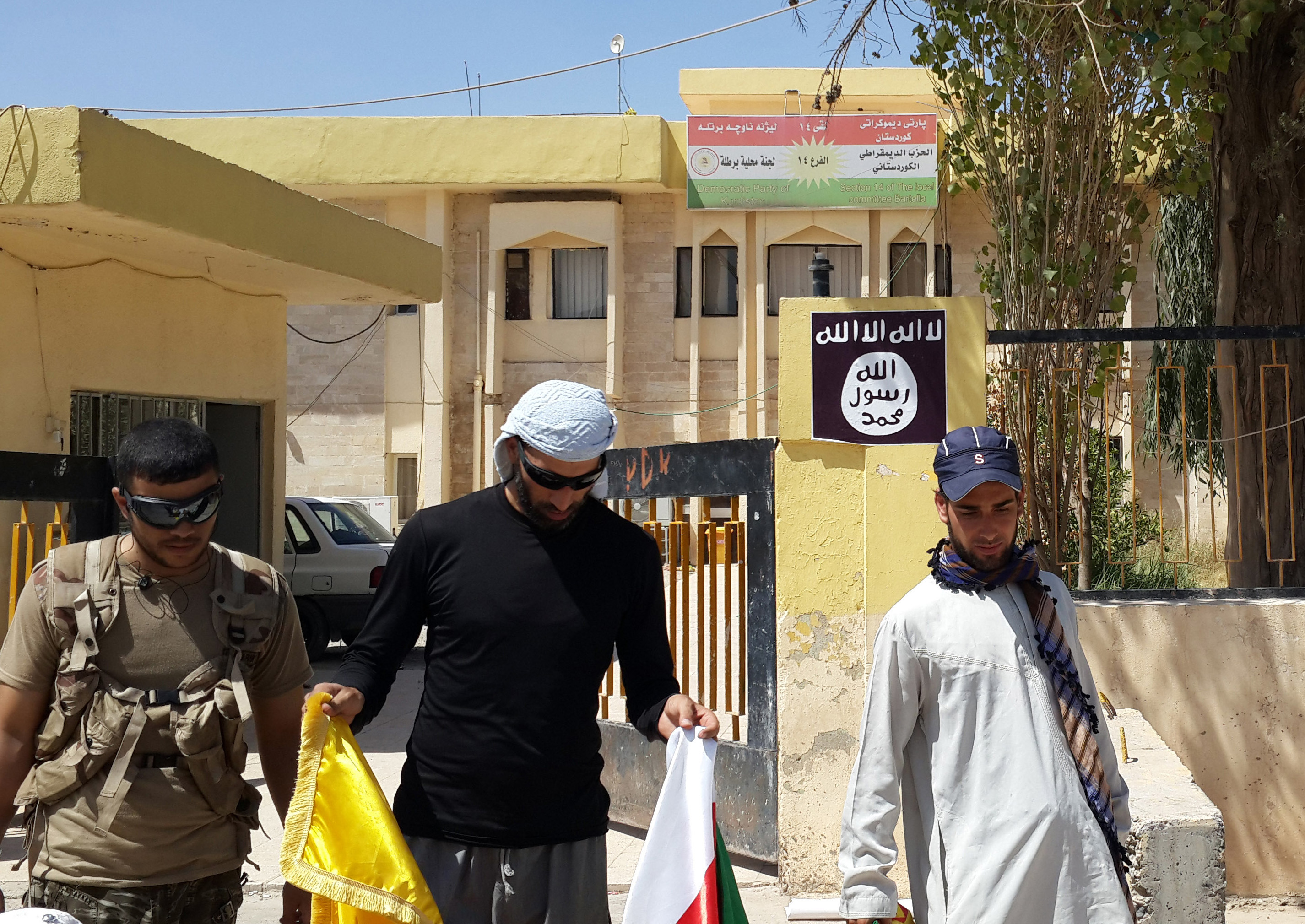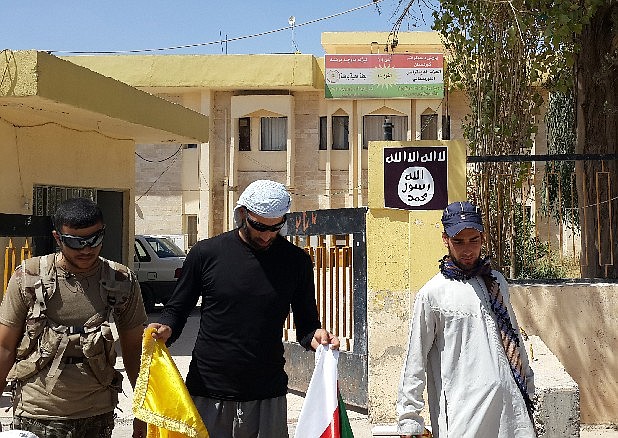Iraqi militants seize country's largest dam
Friday, August 8, 2014
 Islamic State group militants and tribal fighters take down Kurdish flags from the headquarters of the Kurdistan Democratic Party (KDP) in the Christian village of Bartella, northern Iraq, Thursday. Late Wednesday, militants overran a cluster of predominantly Christian villages alongside the country's semi-autonomous Kurdish region, sending tens of thousands of civilians and Kurdish fighters fleeing from the area, several priests in northern Iraq said Thursday.
Islamic State group militants and tribal fighters take down Kurdish flags from the headquarters of the Kurdistan Democratic Party (KDP) in the Christian village of Bartella, northern Iraq, Thursday. Late Wednesday, militants overran a cluster of predominantly Christian villages alongside the country's semi-autonomous Kurdish region, sending tens of thousands of civilians and Kurdish fighters fleeing from the area, several priests in northern Iraq said Thursday.BAGHDAD - Sunni militants from the Islamic State group on Thursday seized Iraq's largest dam, placing them in control of enormous power and water resources and access to the river that runs through the heart of Baghdad.
After a week of attempts, the radical Islamist gunmen successfully stormed the Mosul Dam and forced Kurdish forces to withdraw from the area, residents living near the dam told The Associated Press. They spoke anonymously for safety concerns.
The group's advances came as the capital has been shaken by a string of car bombs that has claimed more than 80 lives in the last two days.
The White House is weighing direct military strikes to stem an Islamic militant group's gains in Iraq, as well as humanitarian relief for thousands of displaced religious minorities in the country's north, according to U.S. defense officials and others familiar with the administration's thinking.
President Barack Obama huddled with his national security team Thursday morning to discuss the crisis as the Islamic State group made further gains. Airstrikes in particular would mark a significant shift in the U.S. strategy in Iraq, where the military fully withdrew in late 2011 after nearly a decade of war.
The Islamic State group posted a statement online Thursday, confirming that they had taken control of the dam and vowed to continue "the march in all directions," adding that it will not "give up the great Caliphate project." The group added that it has seized a total of 17 cities, towns and targets - including the dam - over the past five days. The statement could not be verified but it was posted on a site frequently used by the group.
Halgurd Hekmat, a spokesman for the Peshmerga, told The Associated Press that clashes around the dam are ongoing and he does not know who is in control at this point in time.
The al-Qaida-breakaway group has established its idea of an Islamic state in the territory it controls in Iraq and Syria, imposing its harsh interpretation of Islamic law. Iraqi government forces, Kurds and allied Sunni tribal militiamen have been struggling to dislodge the Islamic State militants and its Sunni allies with little apparent success.
The Mosul Dam - or Saddam Dam as it was once known - is located north of Iraq's second-largest city Mosul, which fell to the militants on June 10. Fighting intensified in the region Sunday after the nearby towns of Zumar and Sinjar fell to the militants. It's not the only dam they are targeting.
Iraq's second largest dam, the Haditha Dam in the western Anbar province, has also been at risk of takeover but remains in the hands of the Iraqi military.
The Kurdish fighters, known as the peshmerga, had initially managed to stall the militant advances, but their defense has waned in recent weeks.
The seizing of dams and reservoirs gives the militants control over water and electricity that they could use to help build support in the territory they now rule by providing the scarce resources to residents. Or they could sell the resources as a lucrative source of revenue.
There are also fears the militants could release the waters of the dam and devastate the country all the way down to the capital Baghdad, though maintaining the dam's power and water supplies will be key to their attempts to build a state.
Late Wednesday, militants overran a cluster of predominantly Christian villages alongside the country's semi-autonomous Kurdish region, sending tens of thousands of civilians and Kurdish fighters fleeing from the area, several priests in northern Iraq said Thursday. The capture of Qaraqoush, Iraq's biggest Christian village, and at least four other nearby hamlets, brings the Islamic State to the very edge of the Iraqi Kurdish territory and its regional capital, Irbil.
The U.S. officials said the administration is weighing an urgent response to help the thousands of trapped religious minorities fleeing their homes, possibly with humanitarian aid.
On Monday, Prime Minister Nouri al-Maliki ordered the Iraqi air force to provide aerial support to the Kurds, in a rare show of cooperation between Baghdad and the Kurdish regional government that underscored the serious nature of this crisis.
The French government on Thursday called for an emergency meeting by the United Nations Security Council to address the advances of the Islamic State militants and "the intolerable abuses committed," and asked that the international community mobilizes itself against the threat.
Even as Sunni militants have been taking control of territory in the north and west of the country, Baghdad has been increasingly targeted by car bombs, with a string of explosions killing at least 83 people in the last two days.
Iraqi officials said in two separate incidents on Thursday, drivers rammed cars packed with explosives into police checkpoints in the northern, predominantly Shiite district of Kazimiyah killing a total of 32 people, most of them civilians, and wounding dozens.
Medical officials confirmed the toll. All officials spoke on condition of anonymity as they were not authorized to release information.
A roadside bomb also went off west of Baghdad in the suburb of Abu Ghraib, killing two soldiers.
